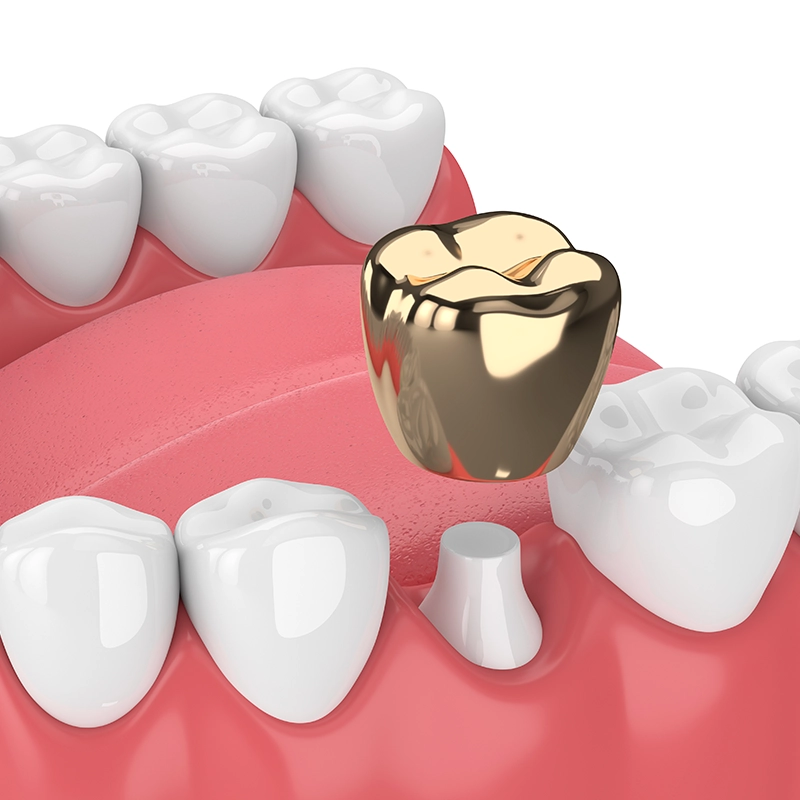
When it comes to dental restorations, crowns play a crucial role in restoring the function, aesthetics, and strength of damaged teeth. A dental crown is a tooth-shaped cap that is placed over a prepared tooth, covering it entirely or partially. It is an effective solution for a variety of dental issues, such as decay, cracks, fractures, or after root canal treatment. Crowns are available in different types, each with its unique characteristics and uses.
In this blog, we will explore the various types of crowns and the factors to consider when choosing the right one for your dental needs.
1. Porcelain Crowns:
- Made from a ceramic material that closely resembles natural tooth color.
- Ideal for restoring front teeth due to its excellent aesthetics.
- Provides durability and strength comparable to natural teeth.
- Less likely to cause allergic reactions.
2. Metal Crowns:
- Constructed from various metals, including gold, nickel, and chromium.
- Offers exceptional strength and durability.
- Highly resistant to wear and tear.
- The visible metal color makes them more suitable for molars rather than front teeth.
3. Porcelain-Fused-to-Metal (PFM) Crowns:
- Combination of porcelain and metal, with the metal providing structural support.
- Provides a balance between aesthetics and strength.
- Suitable for both front and back teeth restorations.
- The metal framework may cause a grayish line near the gumline in some cases.
4. Zirconia Crowns:
- Made from zirconium dioxide, a strong and biocompatible material.
- Offers excellent strength, durability, and aesthetics.
- Resistant to chipping and cracking.
- Suitable for both front and back teeth restorations.
5. E-max Crowns:
- Constructed from lithium disilicate ceramic, which provides exceptional aesthetics.
- Offers high strength and durability.
- Minimal tooth preparation is required, preserving a more natural tooth structure.
- Ideal for front teeth restorations.
6. All-Ceramic Crowns:
- Made entirely of ceramic materials, such as porcelain or zirconia.
- Offers excellent aesthetics, closely resembling natural teeth.
- Biocompatible and highly resistant to staining.
- Suitable for restoring front and back teeth.
7. Temporary Crowns:
- Placed temporarily while waiting for a permanent crown to be fabricated.
- Usually made from acrylic or stainless steel.
- Provides protection and maintains tooth function until the final crown is ready.
- Not as durable as permanent crowns and may require extra care.
Benefits of Dental Crowns include:
Protection and reinforcement: Crowns provide strength and protection to weakened or damaged teeth, preventing further deterioration and reducing the risk of fracture.
Improved aesthetics: Crowns can enhance the appearance of your smile by improving the shape, size, and color of the teeth. They can also correct issues like discoloration, misalignment, or uneven tooth surfaces.
Restored functionality: Crowns restore the function of a tooth, allowing you to bite, chew, and speak properly. They can help restore your ability to eat a wide range of foods comfortably.
Longevity: Depending on the material used and proper oral hygiene, dental crowns can last for many years, providing a long-term solution for tooth restoration.
CAD/CAM: CAD/CAM crowns offer advanced precision, improved cosmetic appearance, shorter turnaround time, increased patient comfort, minimal need for adjustments, improved durability, and the ability to preserve a more healthy tooth structure.
Versatility: Crowns can be used to address various dental issues, including tooth decay, fractures, large fillings, root canal-treated teeth, and missing teeth.
Factors to consider when choosing a Crown:
Aesthetics: Consider the natural appearance of the crown and how well it matches the surrounding teeth.
Strength and Durability: Different materials offer varying levels of strength and durability. Consider the location of the tooth and the force it will endure during chewing.
Biocompatibility: Some individuals may have allergies or sensitivities to certain metals, making all-ceramic or porcelain crowns a better choice.
Treatment process for Dental Crowns
The treatment steps in tooth preparation for the crown:
Consultation and Examination: Your dentist will evaluate your teeth and discuss the need for a dental crown.
X-rays and Impressions: X-rays are taken to assess the tooth's condition, and impressions are made to create a model of your mouth.
Tooth Preparation: The tooth is prepared by removing a portion of its structure and addressing any decay or damage.
Temporary Crown Placement: A temporary crown is placed to protect the tooth while the permanent crown is being fabricated.
Crown Fabrication: The impressions are sent to a dental laboratory where the permanent crown is custom-made from materials like porcelain or metal.
Final Crown Placement: The temporary crown is removed, and the permanent crown is placed and bonded to the tooth using dental adhesive.
Post-Treatment Care: Your dentist will provide instructions for caring for the crown, including proper oral hygiene and regular check-ups.
Maintenance and Follow-up: Regular dental visits are necessary to monitor the crown's condition and ensure its longevity.
In conclusion, dental crowns are versatile restorations that can address a range of dental issues. The type of crown chosen depends on various factors, including aesthetics, strength, durability, and tooth preparation. Sakra World Hospital in Bangalore offers exceptional treatment for dental health, including expert consultations to determine the most suitable crown for individual dental needs. With their expertise, they restore smiles and ensure optimal oral health for long-lasting results.

